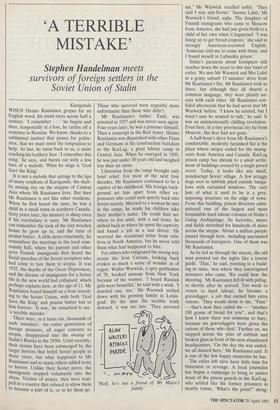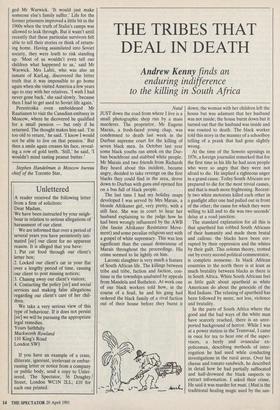'A TERRIBLE MISTAKE'
Stephen Handelman meets
survivors of foreign settlers in the Soviet Union of Stalin
Karaganda WHEN Heimo Rautianen gropes for an English word, his mind races across half a century. 'I remember . . .' he begins and then, temporarily at a loss, he rattles off a sentence in Russian. We know, thanks to a subliminal instinct that passes for polite- ness, that we must resist the temptation to help. At last, he turns back to us, a smile cracking his leathery face. 'I remember this song,' he says, and bursts out with a few bars of a melody. What he sings is 'God Save the King'.
It is not a melody that springs to the lips of many residents of Karaganda, the shab- by mining city on the steppes of Central Asia where Mr Rautianen lives. But then Mr Rautianen is not like other residents. When he first heard the tune, he was a child in a small town in northern Canada. Sixty years later, his memory is sharp even if his vocabulary is rusty. Mr Rautianen can remember the look of the tiny wooden house he grew up in, and the taste of peanut butter. A little more reluctantly, he remembers the meetings in the local com- munity hall, where his parents and other poor Finnish immigrants first heard the florid speeches of the Soviet recruiters who had come to lure them to utopia. It was 1932, the depths of the Great Depression, and the dreams of immigrants for a better life in the new world had collapsed, which perhaps explains how, at the age of 11, Mr Rautianen found himself on a boat travell- ing to the Soviet Union, with both 'God Save the King' and peanut butter lost to him forever. 'It was,' he remarked to me, a terrible mistake.'
There were, as it turns out, thousands of such 'mistakes'. An entire generation of foreign pioneers, all eager converts to utopia, disappeared into the swamp of Stalin's Russia in the 1930s. Until recently, their stories have been submerged by the larger horrors that befell Soviet people in those years, but what happened to Mr Rautianen and so many others added irony to horror. Unlike their Soviet peers, the immigrants stepped voluntarily into the abyss. Victims of utopia, they were trap- ped in a country that refused to allow them to become a part of it, or to let them go. Those who survived were arguably more unfortunate than those who didn't.
Mr Rautianen's father, Emil, was arrested in 1937 and was never seen again. Four years later, he was a prisoner himself. Then a conscript in the Red Army, Heimo Rautianen was dispatched with other Finns and Germans in his construction battalion to the KarLag, a giant labour camp in Central Asia. When he emerged in 1950, he was just under 30 years old and weighed less than six stone.
Liberation from the camp brought only brief relief. For most of the next four decades, Mr Rautianen continued to be a captive of his childhood. His foreign back- ground set him apart from other ex- prisoners who could melt quietly back into Soviet society. Married to a woman he met in the camp, he made his children take their mother's name. He could find no- where to live until, with a sad irony, he drifted back to where he spent his captivity and found a job as a taxi driver. He received the occasional letter from rela- tives in North America, but he never told them what had happened to him.
For others who emigrated the wrong way across the Iron Curtain, looking back evokes as much a sense of wonder as of regret. Walter Warwick, a spry gentleman of 79, booked passage from New York because of the women. 'I heard Russian girls were beautiful,' he said with a wink. 'I married one, too.' Mr Warwick settled down with his growing family in Lenin- grad. By the time the terrible truth dawned, it was too late. 'They arrested
'Well, he's not a friend of Mr Major's family.' me,' Mr Warwick recalled softly. 'They said I was anti-Soviet.' Suoma Lahti, Mr Warwick's friend, sighs. The daughter of Finnish immigrants who came to Moscow from America, she had just given birth to a child of her own when it happened. 'I was lining up to get bread coupons,' she said in strongly American-accented English. 'Someone told me to come with them, and I found myself in Lubianka prison.'
Stalin's paranoia about foreigners still reaches down the years to this tiny band of exiles. We met Mr Warwick and Mrs Lahti in a grimy suburb 15 minutes' drive from Mr Rautianen's flat. Mr Rautianen took us there, but although they all shared a common language, they were plainly un- easy with each other. Mr Rautianen con- fided afterwards that he had never met Mr Warwick before. 'I knew he existed, but I wasn't sure he wanted to talk,' he said. It was an unintentionally chilling revelation. Even here, in a tiny provincial city far from Moscow, the fear had not gone.
A half-hour's drive from Mr Rautianen's comfortable, modestly furnished flat is the place where utopia ended for the immig- rants from America and Canada. KarLag prison camp has shrunk to a small settle- ment of buildings crossed by a single paved street. Today, it looks like any small, nondescript Soviet village. A few scraggy dogs root in rubbish piled outside bunga- lows with curtained windows. The only hint of what it used to be is a grey, imposing structure on the edge of town. From this building, prison directors admi- nistered one of the largest and most formidable hard labour colonies of Stalin's Gulag Archipelago. Its factories, mines and fields stretched for hundreds of miles across the steppe. About a million people passed through here, including uncounted thousands of foreigners. One of them was Mr Rautianen.
As he led us through the streets, the old man pointed out the sights like a tourist guide. 'That,' he said, pointing to a build- ing in ruins, 'was where they interrogated prisoners who came. We could hear the shooting.' Mr Rautianen fell ill with pellag- ra shortly after he arrived. Too weak to return to hard labour, he became a gravedigger, a job that earned him extra rations. 'They would shout to me, "Finn" — that's how they called me — "another 100 grams of bread for you", and that's how I knew there was someone to bury, because we gravediggers were given the rations of those who died.' Further on, we stepped across the piles of rubbish and broken glass in front of the now abandoned headquarters. 'On the day the war ended, we all danced here,' Mr Rautianen said. It is one of the few happy memories he has.
The exiles left alive have little time for bitterness or revenge. A local journalist has begun a campaign to bring to justice many of the prison guards in the KarLag, who settled like the former prisoners in nearby towns. 'What's the point?' shrug- ged Mr Warwick. 'It would just make someone else's family suffer.' Life for the former prisoners improved a little bit in the 1960s when the truth of Stalin's camps was allowed to leak through. But it wasn't until recently that these particular survivors felt able to tell their stories or think of return- . ing home. Having assimilated into Soviet society, they were loath to risk standing up. 'Most of us wouldn't even tell our children what happened to us,' said Mr Warwick. Mrs Lahti, who was also an inmate of KarLag, discovered the bitter truth that it was impossible to go home again when she visited America a few years ago to stay with her relatives. 'I wish I had never gone back,' she said slowly, 'because then I had to get used to Soviet life again.'
Perestroika even emboldened Mr Rautianen to visit the Canadian embassy in Moscow, where he dicovered he qualified for a small pension — but only if he returned. The thought makes him sad. `I'm too old to return,' he said. 'I know I would not be able to live on that pension.' But then a smile again creases his face, reveal- ing a row of gold teeth. 'Still,' he said, 'I wouldn't mind tasting peanut butter.'
Stephen Handelman is Moscow bureau chief of the Toronto Star,



























































 Previous page
Previous page